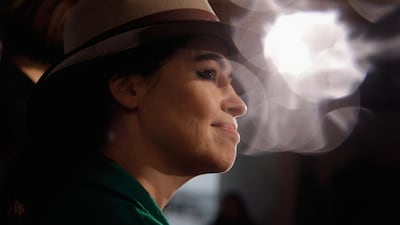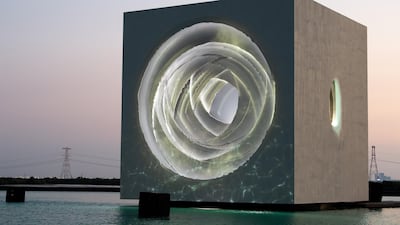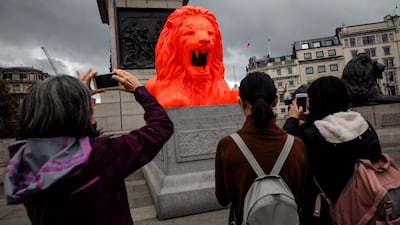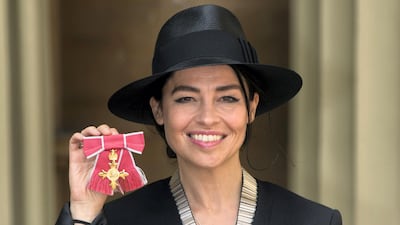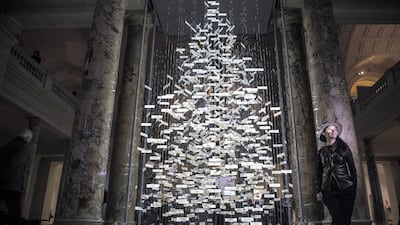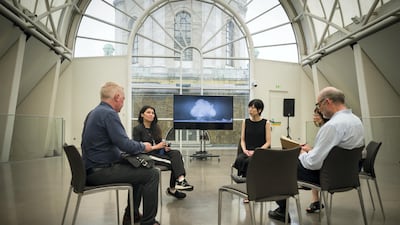The renowned artist and stage designer Es Devlin believes that humanity is holding itself back when it comes to behavioural adaptations needed to battle the climate change crisis.
Devlin said it was important for people to remind themselves that mankind had made huge leaps in the past and could do so again.
"I think we do ourselves quite an injustice because as a species we consider ourselves even more stuck in our ways than we really are," said the artist responsible for The Seed in Jubail Mangrove Park, Abu Dhabi.
She was speaking in an online panel event on Tuesday, entitled "Art, Activism and the Road to Cop26", which explored the role of artists and creativity in engaging people with climate activism.
The event was one of Goals House's series of discussions on sustainable development leading to the Davos Dialogues next week, and eventually to the Cop26 climate talks in Glasgow in November.
Devlin said that before starting a piece of work, she always considers if it warranted the use of the materials. She said that if the particular piece was genuinely going to help people, shift their perspective and adjust thinking in a significant, meaningful way, then it was worthwhile.
“For a topic like climate, you really need to consider the emotions you're looking to tap into,” Devlin said.
"Simple visual connections can help people to make a connection between themselves and the planet."
Global creatives, “thought leaders" and influencers joined the panel in the lead up to the 2021 UN Climate Change Conference, on November 1-12.
The global summit aims to accelerate action towards the goals of the Paris Agreement and the UN Framework Convention on Climate Change.
Her fellow panellists on Tuesday included Oliver Jeffers, the author and artist; Judy Ling Wong, the painter, poet, environmental activist and honorary president of the Black Environment Network; and Paul Bodnar, managing director at the Rocky Mountain Institute and former White House senior director for energy and climate change at the National Security Council.
Also present were Tom Rivett-Carnac, founding partner of Global Optimism; and Anna Cafolla, editor of Dazed.
At the London Design Biennale Summit in June last year, Devlin challenged the design community to tackle the climate crisis.
She became creative director of the 2020 event, saying it was an “opportunity for designers to respond to urgent and radical shifts in every aspect of design that we are all aware need to take place in order for our species to have a chance of survival on this planet".
At 46, Devlin is extremely influential and sought-after for her concepts, many of which fuse music, language and light.
But she says she will only leave her beloved wild garden in the London suburb of Dulwich – created with her husband, the theatrical costume designer Jack Galloway, and their children, Ry and Ludo – for work that really matters.
Lately, that has included The Seed in Abu Dhabi, which was unveiled as a centrepiece for the UAE National Day celebrations last month.
The ceremony was opened by an Emirati boy carrying an illuminated seed to represent the start of the country’s union and development.
“A seed sown in the soil of devotion and a hand generously water it, wishing to reap the fruits of tomorrow,” a narrator said.
Understood to be a metaphor for the growth of the UAE, it will remain open as a public artwork until January 30.
Nightly, visitors watch as images are projected on to a rotating cube to produce a light, sound and musical display that traces the journey from seed, shoot and flower to propagation.
Devlin's links to the UAE do not end there. She also developed the UK Pavilion for Expo 2020 in Dubai, originally scheduled for October last year but postponed until this October because of the coronavirus pandemic.
She became the first woman Britain has commissioned to design its pavilion since the world expositions began in 1851.
The interactive design, called the Poem Pavilion, will use artificial intelligence to generate poetry from words provided by Expo 2020 visitors.
The result will be illuminated on video screens jutting from the sculpture in an ever-changing display as more and more words are added by those attending the world fair.
The Expo project is reminiscent of a previous work for the London Design Festival in 2018, called Please Feed the Lions.
Another interactive installation, this time in the capital’s Trafalgar Square, it featured a fifth lion sculpture placed among the famous bronze four by Sir Edwin Landseer.
Light, music and technology again combined to enable the illuminated fluorescent red interloper to roar poetry out from an LED screen in its mouth, composed of words “fed” to it by members of the public.
Over the years, Devlin has created a host of memorable visual spectacles with large-scale, often kinetic sculptures and installations for opera houses, the Brit Awards and Grammys, and fashion runways.
She has collaborated on concert sets with many musicians, from Wire and U2 to Lady Gaga, Beyonce and Kanye West.
Perhaps her two most recognisable pieces have been a colossal cracked mask of The Weeknd’s face animated by projection-mapped lighting for Coachella 2018, and the tongue slide on which Miley Cyrus entered the stage from her own a gigantic portrait for her Bangerz Tour.
Other stand-outs in Devlin's dazzling body of work include an enormous pair of hands shuffling a deck of cascading cards that formed a floating stage on Lake Constance in Austria for the four-part opera Carmen; and a reinterpretation of the Union Jack featuring a 130-metre wide red, white and blue spin painting by the contemporary artist Damien Hirst during the closing ceremony of the 2012 Olympic Games in London.
She has gathered many awards since her career took off when the British theatre director Trevor Nunn asked her to create the set for the revival of Harold Pinter's play Betrayal at The National Theatre in London in 1998, not least being three Oliviers and an OBE.
